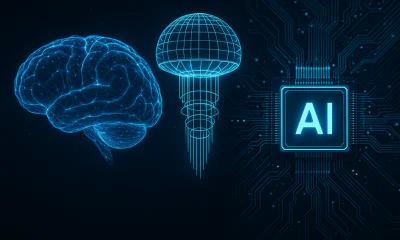AI 101
What are Quantum Computers?
Quantum computers have the potential to dramatically increase the variety and accuracy of computations, opening up new applications for computers and enhancing our models of physical phenomenon. Yet while quantum computers are seeing increasing media coverage, many still aren’t sure of how quantum computers differ from regular computers. Let’s examine how quantum computers work, some of their applications, and their coming future.
What is a Quantum Computer?
Before we can meaningfully examine how quantum computers operate, we need to first define quantum computers. The short definition of a quantum computer is this: a computer, based on quantum mechanics, that is able to carry out certain complex computations with much greater efficiency than traditional computers. That’s a quick definition of quantum computers, but we’ll want to take some time to really understand what separates quantum computers from traditional computers.
Regular computers encode information with a binary system: representing each bit of the data as either a one or zero. Series of ones and zeroes are chained together to represent complex chunks of information like text, images, and audio. Yet in these binary systems, the information can only ever be stored as ones and zeroes, meaning that there is a hard limit to how data is represented and interpreted and that as data becomes more complex it must necessarily become longer and longer strings of ones and zeroes.
The reason quantum computers are able to more efficiently store and interpret data is because they don’t use bits to represent data, rather they use “qubits”. Qubits are subatomic particles like photons and electrons. Qubits have a couple interesting properties that make them useful for new methods of computation. Qubits have two properties that computer engineers can take advantage of: superpositions and entanglement.
Quantum superpositions allow qubits to exist in not just the “one” state or the “zero” state, but along a continuum between these states, meaning more information can be held using qubits. Meanwhile, quantum entanglement refers to a phenomenon where pairs of qubits can be generated and if one qubit is altered the other qubit is altered, in a predictable fashion, as well. These quantum properties can be used to represent and structure complex data in more efficient ways.
How Quantum Computers Operate
Quantum “superpositions” get their name from the fact that they can be in more than one position at a time. While bits can be in just two positions, qubits can exist in multiple states at once.
Thanks in part to the existence of quantum superpositions, a quantum computer is capable of calculating many different potential outcomes at the same time. Once the calculations are done, the qubits are measured, which creates a final result through the collapse of the quantum state to either 0 or 1, meaning the result can then be interpreted by traditional computers.
Quantum computing researchers and engineers can alter the position the qubits are in by using microwaves or precision lasers.
Computer engineers can take advantage of quantum entanglement to dramatically improve the processing power of computers. Quantum entanglement refers to the fact that two qubits can be linked together in such a way that changing one of the qubits alters the other qubit in a reliable way. It’s not fully understood why qubits can establish such a relationship or how this phenomenon works exactly, but scientists do understand it well enough to potentially take advantage of it for quantum computers. Because of quantum entanglement, the addition of extra qubits to a quantum machine doesn’t just double the processing power of a computer it can scale the processing power exponentially.
If this has all seemed a bit too abstract, we can describe how superpositions are useful by imagining a maze. For a normal computer to attempt to solve a maze, it must try each path of the maze until it finds a successful route. However, a quantum computer could essentially explore all the different paths at once, since it isn’t tied down to any one given state.
All of this is to say that the properties of entanglement and superpositions make quantum computers useful because they can deal with uncertainty, they are capable of exploring more possible states and results. Quantum computers will help scientists and engineers better model and understand situations that are multi-faceted, with many variables.
What are Quantum Computers Used For?
Now that we have a better intuition for how quantum computers operate, let’s explore the possible use cases for quantum computers.
We’ve already alluded to the fact that quantum computers can be used to carry out traditional computations at a much faster pace. However, quantum computer technology can be used to achieve things that may not even be possible, or are highly impractical, with traditional computers.
One of the most promising and interesting applications of quantum computers is in the field of artificial intelligence. Quantum computers have the power to improve the models created by neural networks, as well as the software that supports them. Google is currently using its quantum computers to assist in the creation of self-driving vehicles.
Quantum computers also have a role to play in the analysis of chemical interactions and reactions. Even the most advanced normal computers can only model reactions between relatively simple molecules, which they achieve by simulating the properties of the molecules in question. Quantum computers, however, allow researchers to create models that have the exact quantum properties as the molecules they are researching. Quicker, more accurate molecule modeling would aid in the creation of new therapeutic drugs and new materials for use in the creation of energy technology, such as more efficient solar panels.
Quantum computers can also be used to better predict weather. Weather is the confluence of many events and the formulas used to predict weather patterns are complicated, containing many variables. It can take an extremely long time to carry out all the calculations needed to predict the weather, during which the weather conditions themselves can evolve. Fortunately, the equations used to predict weather have a wave nature that a quantum computer can exploit. Quantum computers can help researchers build more accurate climate models, which are necessary in a world where the climate is changing.
Quantum computers and algorithms can also be used to help ensure people’s data privacy. Quantum cryptography makes use of the quantum uncertainty principle, where any attempt to measure an object ends up making changes to that object. Attempts to intercept communications would influence the resulting communication and show evidence of tampering.
Future of Quantum Computing
Most of the uses for quantum computers will be confined to academics and businesses. It’s unlikely that consumers/the general public will get quantum smartphones, at least not anytime soon. This is because it requires specialized equipment to operate a quantum computer. Quantum computers are highly sensitive to disturbance, as even the most minute changes in the surrounding environment can cause qubits to shift position and drop out of the superposition state. This is called decoherence, and it’s one of the reasons that advances in quantum computers seem to come so slowly compared to regular computers. Quantum computers typically need to operate in conditions of extreme low temperatures, isolated from other electrical equipment.
Even with all the precautions, noise still manages to create errors in the calculations, and researchers are looking for ways to make qubits more reliable. To achieve quantum supremacy, where a quantum computer fully eclipses the power of a current supercomputer, qubits need to be linked together. A truly quantum supreme computer could require thousands of qubits, but the best quantum computers today can typically only deal with around 50 qubits. Researchers are constantly making in-roads towards creating more stable and reliable qubits. Experts in the field of quantum computers predict that powerful and reliable quantum devices may be here within a decade.












